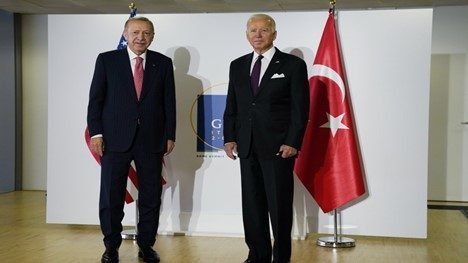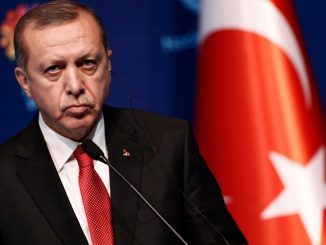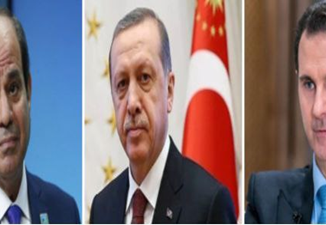
U.S. President Joe Biden may meet President Recep Tayyip Erdogan at the NATO summit this week to discuss Turkiye’s concerns about bids by Sweden and Finland to join the alliance, U.S. national security adviser Jake Sullivan said Monday.
Sullivan said he was not suggesting all issues involved would be resolved by the NATO summit in Madrid later this week but said the goal was to “try and resolve as many of them as possible so that Madrid gives a boost to their candidacies even if there remain some concerns on the part of Turkiye.”
Sullivan told reporters on the sidelines of the G-7 summit in southern Germany that Biden was following a flurry of diplomatic activity on the issue “very closely.”
Finnish and Swedish leaders will also discuss their stalled NATO bids with Erdogan on Tuesday at the start of an alliance summit in Madrid, Helsinki said Monday.
But Turkiye said the four-way meeting, which will also involve NATO chief Jens Stoltenberg, did not mean that Ankara was close to lifting its objection to the two Nordic countries joining the military bloc.
The Finnish presidency said the four leaders will meet in Madrid, before the start of the alliance’s summit, which will focus on Russia’s invasion of Ukraine.
The meeting “will be preceded (Monday) by a round of talks between Finnish, Swedish and Turkish officials hosted by NATO in Brussels,” the Finnish presidency said.
Russia’s invasion of Ukraine earlier this year saw the two Nordic countries abandon decades of military non-alignment by applying for NATO membership in May.
But the joint membership bid, initially believed to be a speedy process, has been delayed by objections from NATO member Turkiye.
Ankara has accused Finland and Sweden, in particular, of providing a safe haven for PKK militants whose decades-long insurgency against the Turkish state has claimed tens of thousands of lives.
The Turkish leader has also called on Sweden and Finland to lift arms embargoes imposed against Turkiye in 2019 over Ankara’s military operation in Syria.
Erdogan signaled on Saturday that no progress had been made in Sweden’s bid to join NATO, urging Stockholm to take “concrete actions” to meet Ankara’s concerns.
Turkish officials said Ankara do not view the summit as a final deadline for resolving its objections.
Erdogan’s chief foreign policy adviser said Tuesday’s four-way meeting did not mean that an agreement was imminent.
“Participating in this summit does not mean that we will step back from our position,” Ibrahim Kalın said.
“We are conducting a negotiation. It has many stages.”
Kalın said Finland and Sweden needed to make “serious changes” to their laws “and constitution” targeting PKK militants.
“We want you to show the same change against the PKK and its affiliated YPG, PYD and similar structures,” he said in reference to PKK-linked groups operating in Syria and Iraq.
NATO Summit
Leaders of NATO member countries and key partners are set to meet in Madrid to discuss issues facing the alliance during a three-day summit beginning on Tuesday.
The allies will try to convince Turkiye to lift its veto over Finland and Sweden’s bid to join the military alliance when they meet, as the West strives to send Russia and China a signal of resolve.
Taking place in the shadow of Russia’s war in Ukraine, the Madrid gathering comes at a pivotal moment for the transatlantic bond after failures in Afghanistan and internal discord during the era of former U.S. President Donald Trump, who threatened to pull Washington out of the nuclear alliance.
Negotiations among an often-fractious organization are still underway, diplomats said, but leaders also hope to agree to provide more military aid to Ukraine, increase joint defense spending, cement a new resolve to tackle China’s military rise and put more troops on standby to defend the Baltics.
Madrid summit will be transformative with many important decisions, including the new strategic concept for a new security reality, NATO Secretary-General Jens Stoltenberg told reporters Monday ahead of the summit in Madrid.
The alliance will transform the NATO response force and increase the number of high readiness forces to well over 300,000, Stoltenberg said.
“We aim to make progress on Finland and Sweden’s membership applications while ensuring security concerns of all allies are addressed,” he also added.
Turkiye’s Concerns
NATO, which was created in 1949 to counter the Soviet threat, is under no treaty obligation to defend Ukraine, as the former Soviet republic is not a NATO member.
But Russian President Vladimir Putin’s Feb. 24 invasion has sparked a geopolitical shift as once neutral countries Finland and Sweden seek to join NATO and Ukraine has formally become a candidate to join the European Union.
If accepted, Finland and Sweden’s inclusion into NATO would bring about the expansion of the alliance that the Russian leader aimed to prevent.
But the bids have faced opposition from Turkiye due to Helsinki and Stockholm’s support for terrorist groups including the PKK and its Syrian branch YPG and arms embargoes on Ankara.
It has many times underlined that the alliance should be in unity, harmony and solidarity against common threats of security and terrorism, expressing its disappointment over some NATO allies’ and candidate countries’ actions harming this spirit of an alliance and ignoring Turkiye’s legitimate security concerns.
Stoltenberg has constantly said that Turkiye has “legitimate concerns related to their fight against the PKK, a terrorist group, and other organizations,” and that the PKK is considered a terror organization by NATO, the Eropean Union, Finland and Sweden.
The NATO summit this week is unlikely to see a breakthrough to overcome Turkiye’s opposition to Sweden and Finland’s membership bids as Ankara takes an unrushed approach to negotiations, according to Turkish officials and Western diplomats.
Turkish negotiators are not concerned with deadlines imposed by foreign allies and are ready to press on for months if needed for the Nordic states to drop arms embargoes and crack down on what it sees as terrorist groups, several sources told Reuters.
A Turkish government official involved in the talks between the three countries and NATO’s Stoltenberg told Reuters it would be difficult to reach a deal at the summit, saying that Sweden and Finland must first address Turkish concerns.
“There were meetings, but unfortunately steps we expected are not being taken,” the official said. “It seems difficult for a result to come out of the NATO summit.”
Sweden has set up a process for ongoing consultations, diplomats said. But two senior NATO diplomats said the dispute was less about technical benchmarks and more about politics.
Based on draft language exchanged by NATO officials and the three sides this month, a big snag is Turkiye’s demand that Sweden, in particular, extradites some PKK/YPG militants living there, said one person close to the matter.
The officials and diplomats did not rule out a last-minute deal. But Turkish Presidential Spokesperson İbrahim Kalın repeated a week ago that Ankara awaits binding steps and does not see the summit as a deadline.
Another person close to the matter, who also requested anonymity due to the sensitivity of talks, said the document outlining Swedish and Finnish commitments had boiled down to a few sections not yet fully agreed.
They included the appropriate treatment of a NATO partner on arms export controls, which the Nordic states applied to Turkiye in 2019; a recognition of certain groups as terrorists; and concrete action on extraditions of individuals, the person said.
Turkiye ramped up engagement in mid-June but its approach “is not driven by internationally-set thresholds…like Madrid”, the person said, adding one step forward was Stockholm’s agreement to ongoing consultations on counter-terrorism.
Analysts predict that there is nearly zero chance that this issue will be resolved at the Madrid summit. However, Spanish Foreign Minister Jose Manuel Albares recently said the host country hopes to sign with Finland and Sweden at the summit as parties could get closer in talks during the one-week window.
NATO enlargement to the Baltic region now hinges on whether these two Nordic countries can satisfy Turkiye’s concerns about terrorism, Kadir Ustun, the executive director at the Washington offices of the Ankara-based Political, Economic and Social Research Foundation (SETA), also told Anadolu Agency (AA) and underlined that the alliance would benefit from their membership, but it cannot come at the expense of Turkish security.
“While many analysts will be quick to portray Turkiye as obstructing NATO enlargement and creating fractures within the alliance, it is essential to understand and address Turkish reservations for cohesion within NATO,” Üstün said and added:
“Turkiye has supported NATO’s open-door policy and membership aspirations of countries like Georgia, Bosnia and Ukraine. Despite significant outstanding issues, a stronger NATO has always been in the Turkish national security interest.
Today, however, Turkiye’s reservations against Finland and Sweden’s NATO membership emanate from Ankara’s long-standing frustration over Western tolerance and support for the PKK and its regional offshoots like the YPG in Syria.”
Since 2014, Western tolerance of the PKK took on an additional geopolitical dimension when the United States and European allies started openly supporting the PKK’s Syrian branch, the YPG.
“The justification was the effectiveness of the YPG in the fight against Daesh terrorism. Reassuring Turkiye that this would be a temporary, tactical, and transactional relationship, the U.S. policymakers extended the policy of working “by, with, through” local partners to the Syrian offshoot of the PKK,” he added.
It is expected that U.S. President Joe Biden could hold a meeting with President Recep Tayyip Erdogan in the margins of the NATO summit to push for progress with Finland and Sweden, whose leaders will be in Madrid.
While the two Nordic countries said talks to resolve the dispute would continue, Erdogan said recently that Ankara had not received any responses to its demands, including stopping support for terrorist groups, lifting arms embargoes on Ankara and extraditing terrorism suspects it seeks.
Earlier this month, Turkiye has said documents it received from Sweden and NATO in response to the earlier written demands it presented the two candidates were far from meeting its expectations and any negotiations must first address Turkish concerns.
Ankara has previously said the Madrid summit is not a deadline. Any NATO membership requires the approval of all 30 members of the alliance. Turkiye has been a NATO ally for more than 70 years and has the alliance’s second-biggest army.
Challenges
Russia’s war against Ukraine has shattered peace in Europe as it caused far-reaching energy and food crises by shaking the rules of the international order since it began on Feb. 24.
As NATO became a more indispensable platform for transatlantic cooperation on security and defense, allies will continue to make decisions to keep the alliance ready against any threat at the summit.
Strengthening NATO’s long-term deterrence and defense, sustaining support for Ukraine, launching NATO’s 2022 Strategic Concept, reinforcing partnerships and maintaining an open door, adapting to threats and challenges from any direction, and transatlantic unity and alliance solidarity will be on the agenda for the member states to discuss.
Some “important” topics to be discussed by members and partners include how Russia’s military operation in Ukraine and the new security reality in Europe affected the alliance’s approach to deterrence and defense; what is NATO doing to address challenges like China’s growing influence, security consequences of climate change and what to include in the next strategic concept.
To protect and defend allied territory amid the current security reality, NATO has more than 40,000 troops under direct command, backed by air and naval assets.
The alliance also doubled the number of battlegroups to eight, extending from the Baltic Sea in the north to the Black Sea in the south.
NATO leaders will “significantly strengthen the alliance’s posture for the long term, with more presence, capabilities and readiness,” according to the alliance, which will require adequate resources and continued investment in defense.
Noting that allies “significantly stepped up with billions of euros’ worth” of additional lethal and nonlethal aid to help Ukraine after Russia launched its war in February, NATO said it builds on the years of NATO training and assistance since Moscow’s illegal annexation of Crimea in 2014.
Leaders of member countries will meet with Ukraine to agree to step up and sustain support for the “longer-term” at the summit.
Serving as a blueprint for future adaption, strategic concepts give the alliance the ability to respond to current security challenges and guide political and military developments for the challenges of tomorrow.
In Madrid, leaders will endorse the 2022 Strategic Concept, which will set out NATO’s joint positions, including on Russia and emerging challenges, and will address China for the first time.
“The Madrid Strategic Concept will reflect the new security environment, recommit to our values, and reaffirm our unity, ensuring that our alliance is fit for the future,” Stoltenberg said of the new concept.
The concept has been reviewed and updated approximately every 10 years since the end of the Cold War. The last one was adopted at the Lisbon Summit in 2010.
The determination to combat all forms of terrorism should be included in NATO’s new strategic concept, Foreign Minister Mevlüt Çavuşoğlu said last month.
Member countries are set to make decisions to maintain NATO’s technological edge, “including through the new Defence Innovation Accelerator for the North Atlantic and a billion euro Innovation Fund, to support startups and develop cutting-edge solutions to security challenges,” according to the alliance.
Terrorism, cyberattacks, China’s “coercive” policies, disruptive technologies and the security impact of climate change are among the topics that the alliance will focus on under the threats and challenges title.
Regarding climate change, leaders will agree on a new methodology to map military greenhouse gas emissions and a target to help NATO contribute to the goal of net-zero emissions.
As NATO faces “the most serious security situation in decades,” the decisions leaders make in Madrid will ensure that NATO continues to preserve “peace, prevent conflict and protect our people and our values,” according to the alliance.
The summit has special importance for Spain as the country is hosting the summit on the 40th anniversary of Madrid’s accession to NATO.
Spain, whose king will host a dinner for leaders, is also pushing for more NATO focus on the southern flank to address migration and militant groups in the Sahel region of Africa.
The leaders of non-NATO Australia, New Zealand, Japan and South Korea are also expected to attend part of the summit, part of a broader U.S. strategy for a more assertive Western presence in the Indo-Pacific region to counter China.
Although British and U.S. officials have advised against a Baltic request for permanent multinational forces in the region, the summit is likely to settle on a compromise of promising rapid reinforcements.
Germany has already said it will put more troops at the ready to defend Lithuania should Russia seek to seize NATO territory and Britain is expected to do the same for Estonia, while Latvia is looking to Canada to pledge more troops there.



